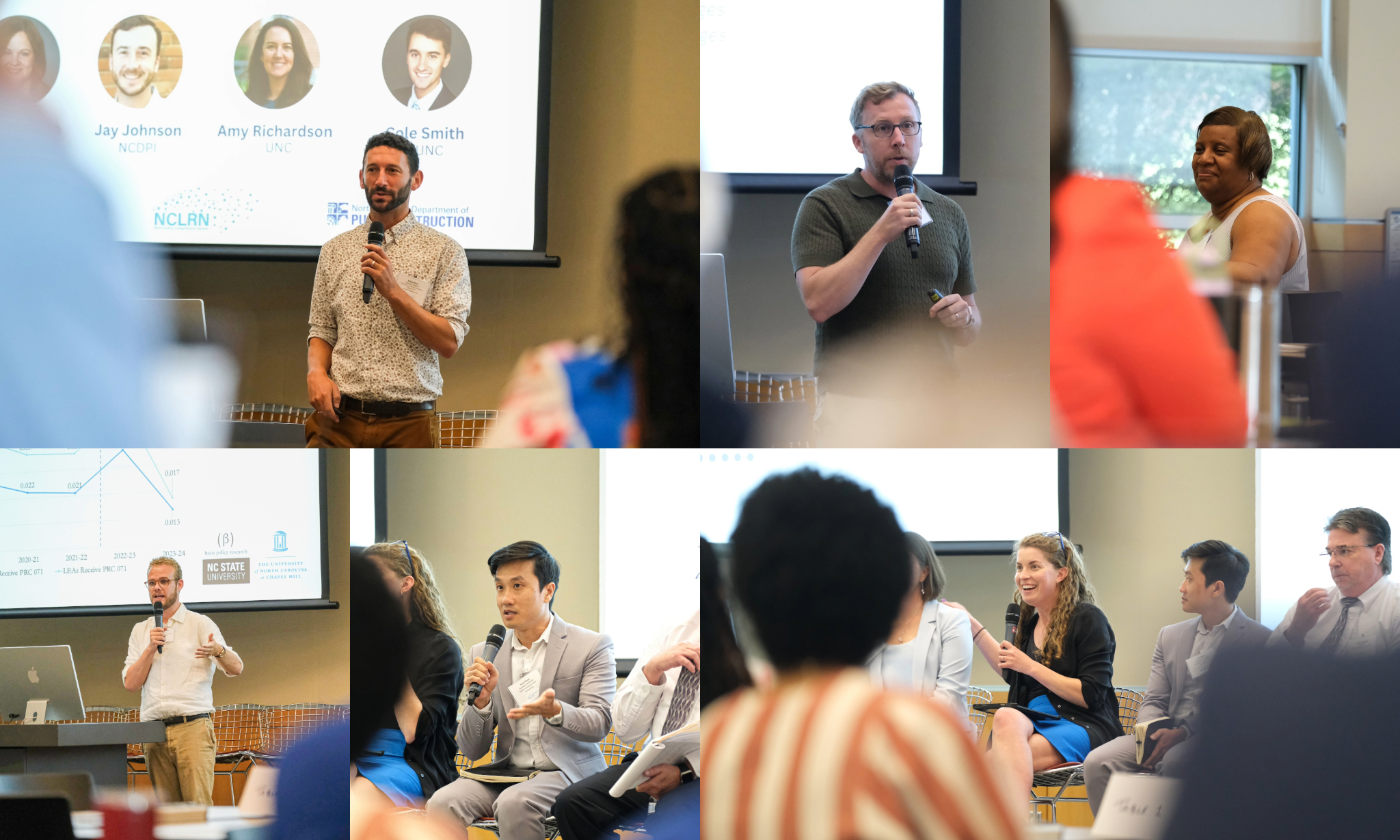The North Carolina Learning Research Network – a partnership between the UNC School of Education, the North Carolina Department of Public Instruction, and the North Carolina Collaboratory – hosted its third annual convening of approximately 70 academic researchers, practitioners, and policymakers on June 26 for a day of presentations and discussions featuring practice-informed research and how that research’s findings can improve North Carolina K-12 and post-secondary education.
Researchers from public and private universities across North Carolina shared 20 projects focused on better understanding and responding to education challenges that arose during and have persisted since the Covid-19 pandemic — faced by students, educators, schools, districts, and more in the state. The meeting also featured an interactive workshop and panel discussion focused on research-practice partnerships – or RPPs – and how to sustain those partnerships, which yield deep insights for students, educators, and schools.
“This is great work and is the kind of work that we in North Carolina should feel very proud to talk about and to continue,” said Maria Pitre-Martin, Ph.D., North Carolina deputy state superintendent. “These efforts reflect the power of combining rigorous research with our local expertise to drive meaningful change.”
Pitre-Martin welcomed attendees, charging them to use the day as a “springboard” for future research-practice partnerships and to pursue research that is “scalable” and “accessible, actionable, and equitably applies across our state.”
The meeting, held at the William & Ida Friday Institute of Educational Innovation on NC State University’s Centennial Campus in Raleigh, was led by Jeni Corn (’97 B.A., ’02 M.Ed.), Ph.D., the NC Collaboratory’s director of research – social sciences, and Ethan Hutt, Ph.D., Gary Stuck Faculty Scholar in Education at the School.
The research findings shared during the meeting had two goals: 1) to determine effectiveness of ESSER III-funded policies and programs and 2) to shed light on the longitudinal impact of Covid-19 on student learning.
Research projects examined state and local teacher bonuses, statewide literacy professional development training, software to mitigate cyberbullying, the pandemic’s impact on the educator workforce, effective practices in virtual learning, post-secondary opportunities of high school juniors and seniors, and more.
UNC School of Education faculty members and doctoral students presented on the following research topics:
- A Comprehensive Evaluation of North Carolina’s Supplemental Salary Fund – Peyton Powers, doctoral student, and Matthew Springer
- Pandemic Priorities: An Analysis of ESSER Budgeting Across North Carolina – Thad Domina, Ph.D., Robert Wendell Eaves Sr. Distinguished Professor in Educational Leadership, and Ethan Hutt, Ph.D., Gary Stuck Faculty Scholar in Education
- The COVID-19 Pandemic and Patterns of Post-Secondary Enrollment in North Carolina – Daniel Klasik, Ph.D., associate professor, and Tom Swiderski, Steve Hemelt, Sarah Fuller, and Matthew Springer
Faculty member Martinette Horner, Ed.D., the School’s Master of School Administration program director, moderated a panel discussion between university-based researchers and practitioners from North Carolina school districts focused on best practices of and lessons learned from research-practice partnerships.
All panel members are participants in the North Carolina Practitioner Network – another School-NCDPI-Collaboratory effort which has brought together administrators from 14 districts, university-based researchers and faculty members, and policymakers to build school districts’ capacity to identify unique challenges their districts face, utilize research methodologies and tools, and then develop evidence-based strategies. Horner co-leads the Network with Amy Richardson, the School’s director of PK-12 partnerships.
To date, the North Carolina Practitioner Network has provided its partnering districts with tools to identify and begin to solve challenges that include teacher retention, student engagement and attendance, professional development for educators, school readiness, enhancing outcomes for students with disabilities, and more.
Paula Arce-Trigatti, Ph.D., director of the National Network of Education, also led attendees through an interactive workshop that introduced them to the RPP Sustainability Framework, prompting them to consider ways to sustain these kinds of partnerships.
“This network – your network – has shown what is possible when we align research with the needs of educators,” said Jeff Warren, Ph.D., NC Collaboratory director, as the day’s events began. “It has underscored the power or partnerships and driving change. Through these research-practice partnerships, we have demonstrated to policymakers the tangible impact that collaborative research has.”
For more about the North Carolina Learning Research Network, visit tarheels.live/ncpn.
For more about the North Carolina Collaboratory, visit collaboratory.unc.edu.
